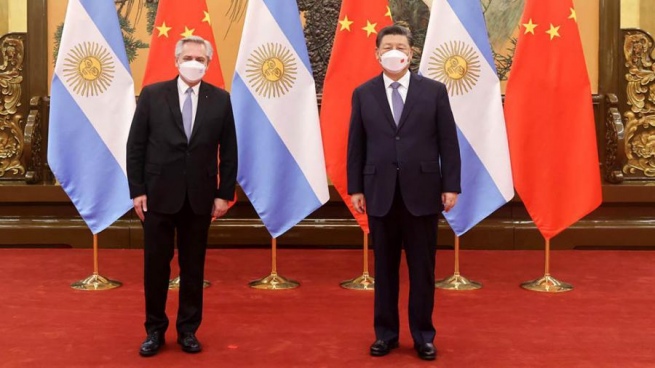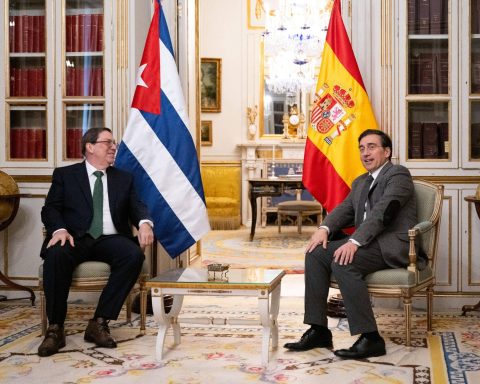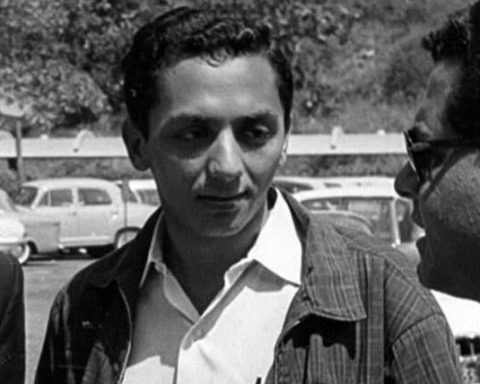The fifty years of bilateral relations with China that are celebrated this Saturday have had in recent decades a change of speed that is far from the immutable patience and long-term planning that is rightly associated with the geopolitical strategy and philosophy of the great Asian power.
With the turn of the millennium, the diplomatic link intensified pushed by the exponential multiplication of trade to and from Argentina.
The timeliness of this diagnosis was exposed with the recent visit of President Alberto Fernández to Beijing, where apart from attending the start of the Winter Olympics, the Argentine delegation signed a Memorandum of Understanding on Cooperation to adhere to China’s great bet in its link with the rest of the world: the Belt and Road Initiative.
It is, as the 143 countries that are part of the proposal already know, an international cooperation project that seeks to establish maritime and rail links in various parts of the planet to guarantee the supply of the Asian giant and that, in return, offers financing from Chinese banks to fund infrastructure works, especially for energy exploitation and transportation.
For Argentine foreign policy, two milestones reflected the importance that economic exchanges with Beijing were acquiring: the strategic partnership held in 2004, and the deepening of that link with the comprehensive strategic partnership, signed in 2014, definitions that institutionalized the format of ” privileged relationship” that both nations maintain in the opinion of several specialists, such as the political scientist Ignacio Villagrán, director of the Center for Argentina-China Studies (Ceach) of the Faculty of Social Sciences of the UBA.

“Within the group of Argentina’s main commercial and financial partners, China has proven to be a reliable partner and an interlocutor with a much greater capacity for dialogue than other actors,” Villagrán described in dialogue with Télam, and also stated that the ” privileged relationship” with China “has proven to be relatively beneficial so far”, offering opportunities due to its “great investment capacity in infrastructure works”.
These potentialities are, for Argentina, a palpable and daily reality: this Friday, on the occasion of the 50th anniversary of the establishment of diplomatic relations, the Beijing ambassador in Buenos Aires, Zou Xiaoli, participated in a conference on the Zoom platform together with the minister of Productive Development, Matías Kulfas, and the Secretary of International Economic Relations of the Foreign Ministry, Cecilia Todesca Bocco, plus leading businessmen such as Mario Grinman (Argentine Chamber of Commerce and Services), Daniel Funes de Rioja (UIA) and Orlando Castellani (Adimra) .
In that speech, Zou listed China’s investments in Argentina that are being deployed or fully operational, and then mentioned “the rehabilitation of the Belgrano Cargas Railway line and the San Martín Line Railway system, the Cauchari photovoltaic (solar energy) park in Jujuy, the Kirchner and Cepernic dams in Santa Cruz, the Far Space Station in Neuquén, the 40 meter diameter Radio Telescope base in San Juan and the Atucha III nuclear power plant in the province of Buenos Aires”, as well as “projects transport, energy and special technology”.
But the present of the bilateral relationship and the short-term prospects not only offer opportunities in terms of foreign direct investment.
Argentina, as was made clear in the President’s last tour, aspires to join the economic and commercial association baptized as BRICS, which includes Brazil, Russia, India, China and South Africa, and one of the definitions that the head of state brought from The return of Beijing -also from Moscow- is the acceptance of the Chinese leader Xi Jinping for the country to join this exclusive bloc of the main emerging countries.
Xi’s agreement, as well as Russian President Vladimir Putin’s favorable stance on this point, could add to Brazil’s endorsement if Luiz Inácio Lula Da Silva prevails in the next presidential election.
Ten days ago, former Foreign Minister Celso Amorim, one of the main collaborators of the founder of the PT, assured in journalistic statements that Brazil should support Argentina’s entry into the BRICS because its incorporation “would give strength to Mercosur and integration.”

The bond with China is a major issue for the international positioning of the country and in the Front of All they understand its strategic condition, which also includes mutual support in sensitive conflicts for territorial integrity, such as the Malvinas and Taiwan; At the same time, they highlight that the economic relationship, which is already very intense, has some facets to deepen and nuance if it is observed from Argentine interests: they aim, for example, to diversify exports to the second trading partner to add added value and to that the dollars that come in do not come almost exclusively from the sale of soybeans and beef, which are key anyway.
Another similar search consists of the incorporation of Argentine parts and components to the infrastructure projects that are bilaterally agreed, as well as continuing to encourage the landing of Chinese investments in the productive chains that are export-oriented.
For some representatives of the business sector, as in the case of the metallurgical industry, the link with the Asian giant must include among its priorities “the construction of networks and the joint design of innovative projects” that associate Chinese companies with Argentine SMEs, an objective that According to Castellani, representative of Adimra, “it is essential to guarantee the sustainability of the activity”.
“We have to improve the large trade imbalance we have,” exhorted the head of the metallurgical association in the same vein, referring to the impact on his field of the equation between import and export activity aimed at the large Asian market.
From the Cabinet, leading the virtual talk on the 50 years of ties with Beijing, both Kulfas and Todesca Bocco -both economists- valued everything that was achieved in a relationship that they defined as “intense” and “with a lot of room to continue growing “.
“In half a century of diplomatic relations between Argentina and the People’s Republic of China, we have built a very intense and highly valued relationship,” remarked Kulfas, who mentioned “the knowledge economy” and the exploitation of “natural resources” as areas in which that scientific-technological cooperation and commercial exchange could be deepened.
This Saturday, 50 years after the signing of a joint statement in Bucharest, Romania, on February 19, 1972, with which they established diplomatic ties, Argentina and the People’s Republic appear, in the words of the Argentine ambassador Sabino Vaca Narvaja, as ” complementary economic structures” that built a “comprehensive” and “strategic” relationship, and that are faced with the challenge of putting into action the always desired “win/win policy”.

















